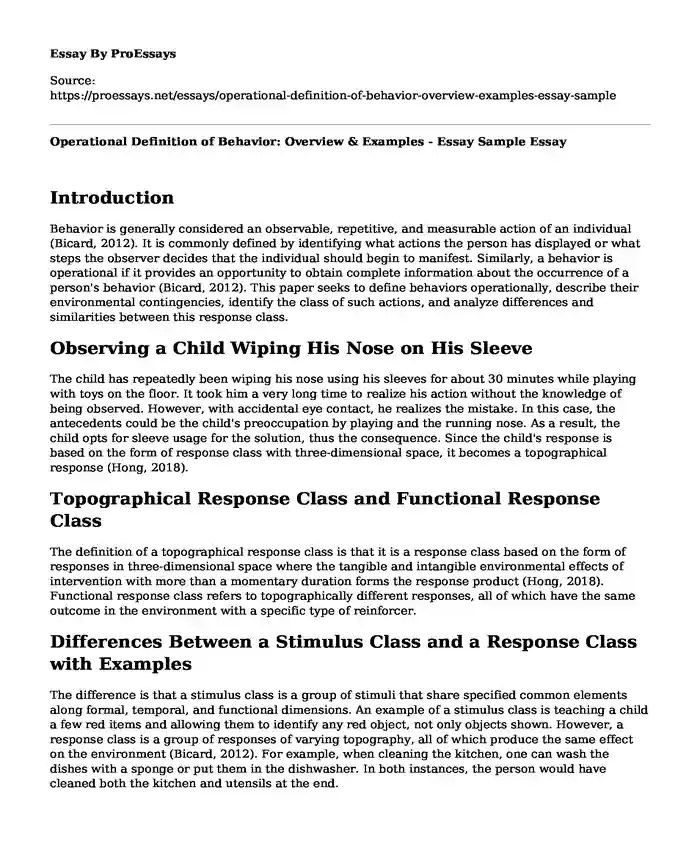Introduction
Behavior is generally considered an observable, repetitive, and measurable action of an individual (Bicard, 2012). It is commonly defined by identifying what actions the person has displayed or what steps the observer decides that the individual should begin to manifest. Similarly, a behavior is operational if it provides an opportunity to obtain complete information about the occurrence of a person's behavior (Bicard, 2012). This paper seeks to define behaviors operationally, describe their environmental contingencies, identify the class of such actions, and analyze differences and similarities between this response class.
Observing a Child Wiping His Nose on His Sleeve
The child has repeatedly been wiping his nose using his sleeves for about 30 minutes while playing with toys on the floor. It took him a very long time to realize his action without the knowledge of being observed. However, with accidental eye contact, he realizes the mistake. In this case, the antecedents could be the child's preoccupation by playing and the running nose. As a result, the child opts for sleeve usage for the solution, thus the consequence. Since the child's response is based on the form of response class with three-dimensional space, it becomes a topographical response (Hong, 2018).
Topographical Response Class and Functional Response Class
The definition of a topographical response class is that it is a response class based on the form of responses in three-dimensional space where the tangible and intangible environmental effects of intervention with more than a momentary duration forms the response product (Hong, 2018). Functional response class refers to topographically different responses, all of which have the same outcome in the environment with a specific type of reinforcer.
Differences Between a Stimulus Class and a Response Class with Examples
The difference is that a stimulus class is a group of stimuli that share specified common elements along formal, temporal, and functional dimensions. An example of a stimulus class is teaching a child a few red items and allowing them to identify any red object, not only objects shown. However, a response class is a group of responses of varying topography, all of which produce the same effect on the environment (Bicard, 2012). For example, when cleaning the kitchen, one can wash the dishes with a sponge or put them in the dishwasher. In both instances, the person would have cleaned both the kitchen and utensils at the end.
Stimulus Class are also the first events to occur and can be of any magnitude, but1 the response class are the result and can never go beyond the highest capability of an individual. Also, Stimulus classes cannot be controlled, especially the external stimuli, that determines the responses. On the contrary, response classes are controllable and never happen without the stimuli.
Similarities Between a Stimulus Class and a Response Class
A stimulus class and response class are similar in that they usually occur concurrently with the stimulus class initiating the response class (Bicard, 2012). Furthermore, both the stimulus class and the response class determine the behavior of a subject.
References
Bicard, S., Bicard, D., & IRIS, C. (2012). Defining behavior. US: IRIS Center, US Department of Education. http://iriscenter.com/wp-content/uploads/pdf_case_studies/ics_measbeh.pdf
Hong, E., Dixon, D., Stevens, E., Burns, C., & Linstead, E. (2018). Topography and function of challenging behaviors in individuals with autism spectrum disorder. Advances in Neurodevelopmental Disorders, 2(2), 206-215. https://link.springer.com/article/10.1007%2Fs41252-018-0063-7
Cite this page
Operational Definition of Behavior: Overview & Examples - Essay Sample. (2023, Oct 27). Retrieved from https://proessays.net/essays/operational-definition-of-behavior-overview-examples-essay-sample
If you are the original author of this essay and no longer wish to have it published on the ProEssays website, please click below to request its removal:
- What is Anxiety? - Paper Example
- Relationship Between the Counsellors and the Clients and Spirituality Paper Example
- Healthy Eating for the Older Population Paper Example
- Psychology Self-Analysis Paper Example
- Essay Sample on Treating Unipolar Depressive Disorder: Pharmacological & Non-Pharmacological Methods
- Essay Example on John and Emma: Benefits and Harms of Counselling Relationship
- Article Analysis Essay on Community Mental Health Policy in America: Lessons Learned







